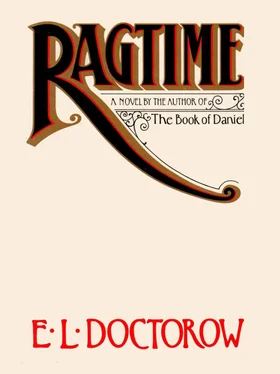Edgar Doctorow - Ragtime
Здесь есть возможность читать онлайн «Edgar Doctorow - Ragtime» весь текст электронной книги совершенно бесплатно (целиком полную версию без сокращений). В некоторых случаях можно слушать аудио, скачать через торрент в формате fb2 и присутствует краткое содержание. Жанр: Современная проза, на английском языке. Описание произведения, (предисловие) а так же отзывы посетителей доступны на портале библиотеки ЛибКат.
- Название:Ragtime
- Автор:
- Жанр:
- Год:неизвестен
- ISBN:нет данных
- Рейтинг книги:4 / 5. Голосов: 1
-
Избранное:Добавить в избранное
- Отзывы:
-
Ваша оценка:
- 80
- 1
- 2
- 3
- 4
- 5
Ragtime: краткое содержание, описание и аннотация
Предлагаем к чтению аннотацию, описание, краткое содержание или предисловие (зависит от того, что написал сам автор книги «Ragtime»). Если вы не нашли необходимую информацию о книге — напишите в комментариях, мы постараемся отыскать её.
Ragtime — читать онлайн бесплатно полную книгу (весь текст) целиком
Ниже представлен текст книги, разбитый по страницам. Система сохранения места последней прочитанной страницы, позволяет с удобством читать онлайн бесплатно книгу «Ragtime», без необходимости каждый раз заново искать на чём Вы остановились. Поставьте закладку, и сможете в любой момент перейти на страницу, на которой закончили чтение.
Интервал:
Закладка:
They would swim in midafternoon, when the air became still and the heat oppressive. Mother’s bathing costume was modest but she required several days to feel comfortable in it. It was black, of course, with skirt and pantaloons that came below her knees and low-cut swim shoes. But her calves were exposed and her neck, almost to the bodice. She insisted that they separate themselves by several hundred yards from the nearest bathers. They encamped under a hotel umbrella with its name imprinted in orange upon its escalloped fringe. The Negro woman sat upon a straw chair some yards away. The boy and the brown child studied the tiny crabs that buried themselves with a bubbly trail in the wet sand. Father wore a horizontal striped blue and white sleeveless one-piece bathing suit that made cylinders of his thighs. Mother found it distasteful to see the outlines of his maleness in that costume when he emerged from the water. Father liked to swim out. He lay on his back beyond the breakers spouting water like a whale. He came in staggering through the waves, laughing, his hair flattened on his head, his beard dripping and his costume clinging to him immodestly, and she felt momentary twinges of dislike, so fleeting she didn’t even recognize what they were. After sea bathing everyone retired for a rest. She would remove her costume with relief, having wet it only for a few moments in the foamy surf, and sponge the salt from her skin. She was so fair that the shore was dangerous for her. Yet cooled by her ablutions, powdered and loosely gowned, she could feel the sun stored in her, spreading in her blood, lighting it as the noon it did the sea, with millions of diamond flashes of light. After-the-swim was soon established by Father as the time for amour. He would make his lusty heedless love every day if she allowed it. She silently resented the intrusion, not as in the old days but with some awareness of her own, some sort of expectation on the skin that was only pounded from her. She thought about Father a good deal. The events since his return from the Artic, his response to them, had broken her faith in him. The argument he had had with her brother still resounded in her mind. Yet at moments, for the whole days at a time, she loved him as before — with a sense of the appropriateness of their marriage, its fixed and unalterable character, as something heavenly. Always she had intuited a different future for them, as if the life they lead was a kind of preparation, when the manufacturer of flags and fireworks and his wife would lift themselves from their respectable existence and discover a life of genius. She didn’t know of what it would consist, she never had. But now she no longer waited for it. During his absence when she had made certain decisions regarding the business, all its mysterious potency was dissipated and she saw it for the dreary unimaginative thing it was. No longer expecting to be beautiful and touched with grace till the end of her days, she was coming to the realization that whereas once, in his courtship, Father might have embodied the infinite possibilities of loving, he had aged and gone dull, made stupid, perhaps, by his travels and his work, so that more and more he only demonstrated his limits, that he had reached then, and that he would never moved beyond them.
Yet she was happy to be in Atlantic City. Here Sarah’s child was protected. For the first time since Sarah’s death she could think of her without weeping. She enjoyed being viewed in public, as in the dining room at the hotel or on the veranda in the evening, or strolling on the boardwalk down to the pavilions and piers and shops. Sometimes they hired a chair in which she and Father sat aside and were slowly pushed along by a porter. They made lazy examination of the occupants of chairs going in the opposite direction, or glanced discreetly at the other riders they happened to pass. Father tipped his straw. The chairs were wicker, with fringed canvas tops that reminded her of the surreys of her childhood. The two side wheels were large, as on a safety bicycle; the small wheel in front swiveled and sometimes squeaked. He son loved these chairs. They could be hired too without a man, and he loved that best of all, for then he pushed the chair with his mother and father seated in it and he could direct it as he would, at whatever speed, without their feeling the need of instructing him. The great hotels stood behind the boardwalk, one next to the other, their awnings flapping in the sea wind, their immaculately painted porches lined with rocking chairs and white wicker settees. Nautical flags flew from the cupolas and at night they were lighted by rows of incandescent bulbs strung along their roof lines.
One night the family stopped at a pavilion where a brass band of Negroes stoutly played a rag, she didn’t know which one, that she remembered ringing from her piano at home under the fine hands of Mr. Coalhouse Walker. She had for days lived not in forgetfulness of the tragedy but in relief from it, as if in this resort city by the sea painful thought were blown off by the prevailing breezes as soon as they formed. Now she was almost overcome by the music which was associated in her mind also with Younger Brother. And immediately her love for her brother, a wave of passionate admiration, broke over her. She felt she had neglected him. An image of his lean moody impetuous being flashed in her mind, somewhat reproachful, somewhat disgusted. It was the way he had looked at her over the dining table at home as Father cleaned his pistol. She felt a slight vertigo, and looking into the lights of the pavilion where the indomitable musicians sat in red and blue uniforms with their shiny trumpets and cornets, tubas and saxophones, she thought she saw under each trim military cap the solemn face of Coalhouse.
After that evening Mother’s joy in the seashore was more tenuous. She had to concentrate on each day as it came. She attempted by sheer resolve to make it serene. She as affectionate to her son, her husband, her invalid father; she was affectionate to her Negro woman and most of all to the still-unchristened and beautiful son of Sarah, who was thriving here and seemed to be growing visibly. She began to consider the attentions that were being paid her by various of the hotel guests. They hovered on the edges of her consciousness, waiting for some consideration from her. For simple occupation she was now prepared to bestow this. There were several impressive Europeans at the hotel. One was a German military attaché to his embassy who wore a monocle and always saluted her with discreet gallantry. He was tall and wore that cropped hair they affected and came to dinner in his formal uniform of white, with black bow tie. He made a great show of ordering wines and then rejecting them. There were no women in his party but three or four men, somewhat coarser-looking, whose rank was apparently inferior to his. Father said he was a Captain von Papen and that he was an engineer. They saw him every day walking the beach and unrolling charts and pointing to sea and speaking to his aides. Usually there was at the time a small craft slowly traversing the horizon. It is some kind of engineering survey, Father said lying on the beach sand with his face to the sun. I can’t imagine why the South Jersey coast should interest Germans. Farther was oblivious to the man’s speculative notice of his wife. Mother was amused by this. She knew from the first careless glance she returned to the officer that he presented to her only the most lascivious intentions focused, as it were, in the imperiousness of his monocled gaze. She decided to ignore him.
There was an elderly French couple with whom she learned to exchange pleasantries; she laughed to recall her schoolgirl French and they very generously complimented her accent. They never appeared in the sun except cocooned in endless swaths of linen and gauze topped with Panama hats. For good measure they carried parasols. The man who was shorter than his wife and quite heavy, had liver spots on his face. He wore thick glasses. He had enormous pendent ear lobes. He carried a butterfly net and jar with a cork stopper and she a picnic hamper so heavy that she could not walked upright with it. Each morning she struggled after him over the dunes and they disappeared in the distant haze where there were no hotels, no boardwalk, only the gulls and sandpipers and the dune grasses, where sat the trembling wings for which he lusted. He was a retired history professor from Lyons.
Читать дальшеИнтервал:
Закладка:
Похожие книги на «Ragtime»
Представляем Вашему вниманию похожие книги на «Ragtime» списком для выбора. Мы отобрали схожую по названию и смыслу литературу в надежде предоставить читателям больше вариантов отыскать новые, интересные, ещё непрочитанные произведения.
Обсуждение, отзывы о книге «Ragtime» и просто собственные мнения читателей. Оставьте ваши комментарии, напишите, что Вы думаете о произведении, его смысле или главных героях. Укажите что конкретно понравилось, а что нет, и почему Вы так считаете.












